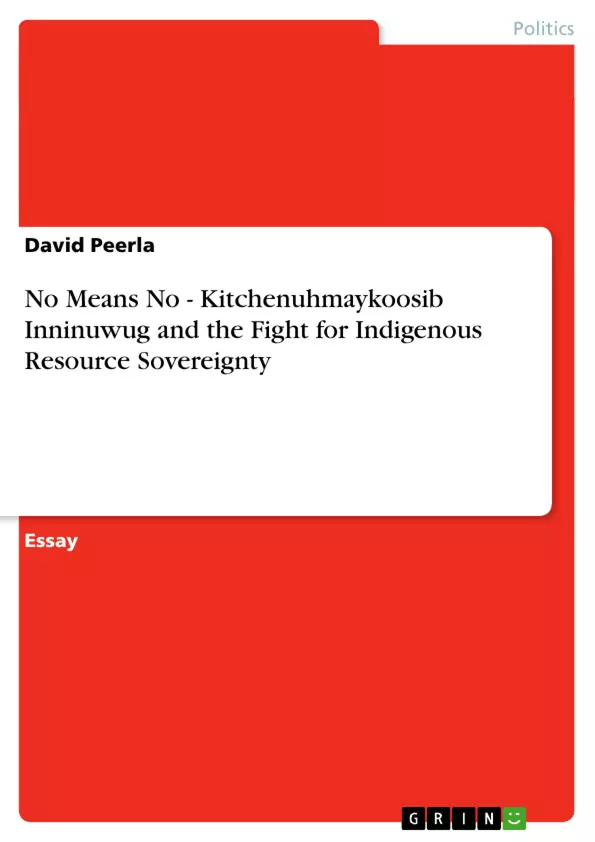In 2006, the remote Ontario First Nation of Kitchenuhmaykoosib Inninuwug (KI) said no to a mining company, was sued for $10 billion, had its leaders found in contempt of court and jailed but eventually prevailed when, three years later, the Ontario government paid the company $5 million to go away. This is how it happened.
Inhaltsverzeichnis (Table of Contents)
- The $10 Billion Lawsuit
- Ontario Intervenes
- The Jailing of the KI6
- The Sovereignty Sleepover and the Court of Appeal
- Aftermath
- Lessons
Zielsetzung und Themenschwerpunkte (Objectives and Key Themes)
This book examines the legal battle between the Kitchenuhmaykoosib Inninuwug (KI) First Nation and mining company Platinex over the right to control KI’s traditional territory. It highlights the conflict between economic development and Indigenous land rights, the role of the Canadian legal system in these disputes, and the importance of First Nation sovereignty and self-determination.- The struggle for Indigenous resource sovereignty
- The challenges of achieving free, prior, and informed consent in resource development
- The limits of consultation and accommodation in resolving Indigenous land claims
- The role of legal strategies in Indigenous resistance
- The importance of community solidarity and international support in Indigenous struggles
Zusammenfassung der Kapitel (Chapter Summaries)
- The $10 Billion Lawsuit: This chapter introduces the KI community, their traditional territory, and the ongoing struggle for land rights in the face of mining exploration. It describes the legal framework governing mining in Ontario and how it has been used to undermine Indigenous sovereignty.
- Ontario Intervenes: This chapter explores the KI’s legal battle against Platinex, including the initial injunction, the role of the Ontario government, and the mounting costs associated with the case. It highlights the challenges faced by Indigenous communities in navigating the legal system and the limitations of consultation processes.
- The Jailing of the KI6: This chapter details the imprisonment of KI leaders for contempt of court after their refusal to comply with a court order allowing Platinex access to their lands. It examines the harsh penalties imposed on Indigenous leadership for exercising their right to defend their territory and the public outcry over the sentences.
- The Sovereignty Sleepover and the Court of Appeal: This chapter covers the KI’s successful appeal of their jail sentences and the broader campaign for Indigenous sovereignty. It explores the growing movement of solidarity among various groups supporting KI, the legal arguments raised in the appeal, and the limitations of existing legal frameworks.
- Aftermath: This chapter examines the long-term consequences of the KI struggle, including the settlement of Platinex’s lawsuit and the subsequent reforms to Ontario’s Mining Act. It discusses the ongoing challenges faced by First Nations in securing their rights and the continued importance of self-determination.
- Lessons: This chapter offers reflections on the broader significance of KI’s struggle and its implications for other Indigenous communities. It highlights the importance of Indigenous resistance, the limitations of legal strategies in achieving true sovereignty, and the need for a fundamental shift in how resource development is approached.
Schlüsselwörter (Keywords)
This work centers on Indigenous land rights, resource sovereignty, and the challenges of achieving free, prior, and informed consent in Canada. Key concepts explored include the intersection of law, politics, and Indigenous cultural practices, the role of courts and legal systems in shaping Indigenous rights, and the strategies of resistance employed by communities in asserting their sovereignty.Frequently Asked Questions
What was the legal conflict between KI and Platinex?
The Kitchenuhmaykoosib Inninuwug (KI) First Nation opposed mining exploration on their traditional territory by Platinex, leading to a $10 billion lawsuit and the jailing of community leaders.
Why were the "KI6" leaders jailed?
Six KI leaders were jailed for contempt of court after they refused to allow Platinex access to their lands, despite a court order granting the company exploration rights.
How did the dispute end?
After three years of legal battle and public outcry, the Ontario government paid Platinex $5 million to drop the lawsuit and withdraw from KI territory.
What is "free, prior, and informed consent" (FPIC)?
FPIC is a specific right of Indigenous peoples to give or withhold consent to projects that may affect them or their territories, a central theme in the KI struggle.
What were the long-term consequences of this case?
The struggle led to significant reforms in Ontario's Mining Act and highlighted the need for better recognition of Indigenous sovereignty and land rights in Canada.
- Arbeit zitieren
- David Peerla (Autor:in), 2012, No Means No - Kitchenuhmaykoosib Inninuwug and the Fight for Indigenous Resource Sovereignty, München, GRIN Verlag, https://www.grin.com/document/206677



